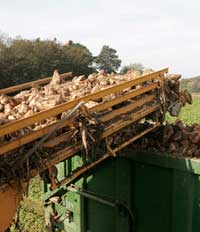New strain of rhizomania spreading in Suffolk

UK sugar beet crops face the twin threat of a new, highly localised strain of rhizomania which can overcome varietal resistance plus the remergence of virus yellows.
Speaking to the BBRO conference, Mark Stevens of Broom’s Barn outlined how the new strain was being closely monitored, after its discovery in 2008.
The changed strain was originally found in half-a-dozen fields near Woodbridge in Suffolk, but has since spread to Essex, probably by soil movement, he said
“There were a further four cases of this new strain, known as AYPW, confirmed in 2009,” notes Dr Stevens. “The affected crops display strong leaf and root-madness symptoms.”
The fact that the new strain can overcome resistance is a concern, he admitted. “In 2010, half of the varieties planted will be resistant types. We’ve seen that sugars are reduced by 3-4% by this new strain.”
Susceptible varieties could be killed, he warned. “We’re keeping a very close eye on this development and looking at the make-up of rhizomania strains. Fortunately there are genetics coming along with stronger resistance.”
In contrast, virus yellows is not a new disease. But it was a re-emerging threat, despite that fact that 90% of the UK sugar-beet crop receives an effective seed treatment.
Climate change, uncertainty about the future of some pesticides and the threat of resistance to the neonicotinoids could all make virus yellows a concern again, he suggested.
“Warmer winters work in favour of the main aphid vector, Myzus persicae,” he said. “Although we’ve just had a cold winter, statistics show that in the last 10 years, seven would have been epidemics.”
Questions being asked in France, Germany and Italy about the environmental safety of the neonicotinoids are an indication of the increasing threat to their future, he added.
“And although there have been no cases of field breakdown to this chemistry in 16 years of use, researchers are just beginning to pick up the first signs of resistance problems in foliar sprays used on tobacco crops.”
Without seed treatments, growers would be reliant on foliar sprays, most of which the peach potato aphid already has some resistance to, said Dr Stevens.
“This would make us reliant on integrated strategies in the future,” he ended. “There’s no major single source of resistance in the germplasm, but GM crops do offer an opportunity to introduce virus resistance.”
| This year’s record-breaking sugar beet crop averages 72.9t/ha read more…
